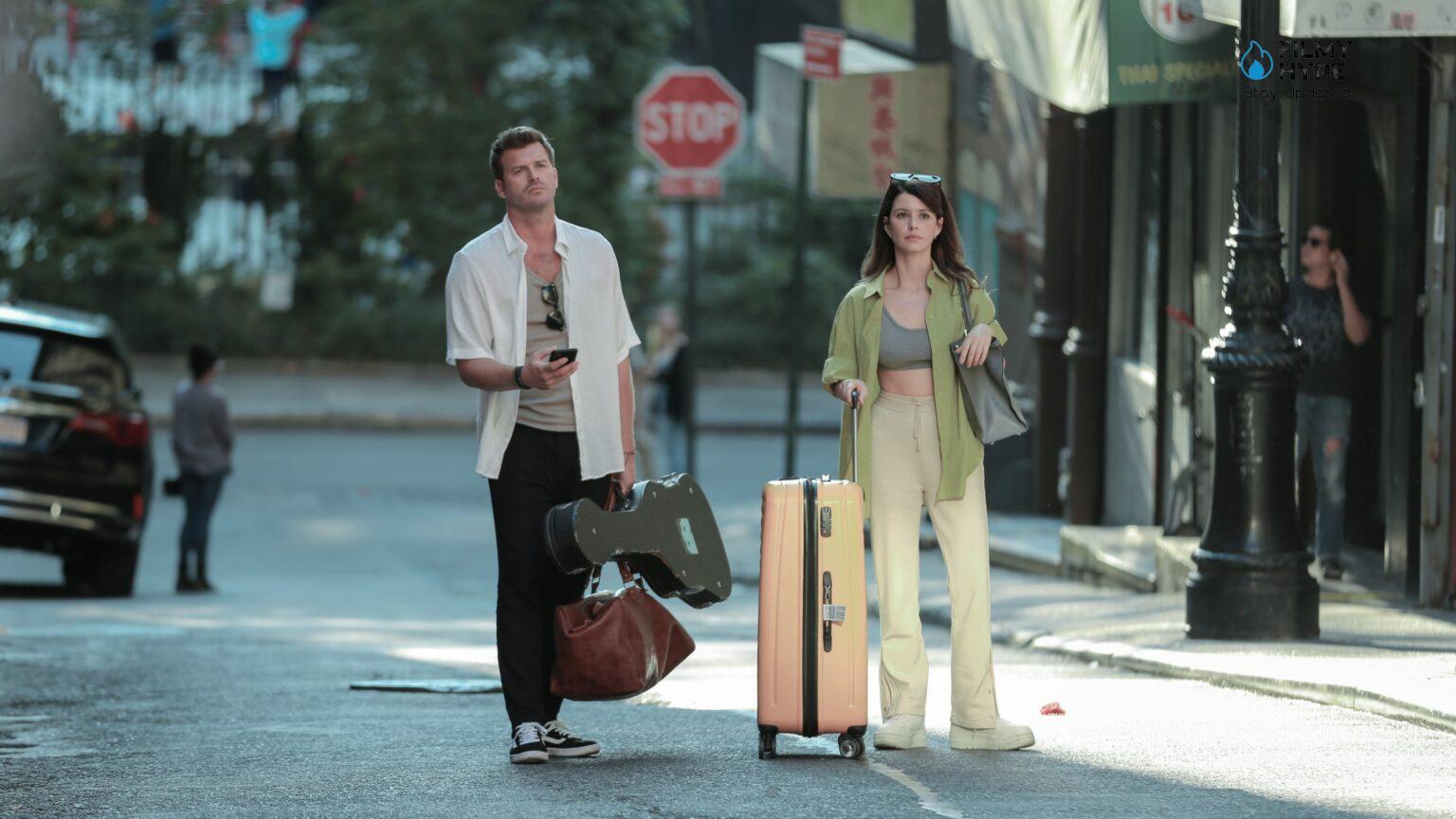Last Call for Istanbul Review: Romantic Comedy that is Sure to Please Fans of the Genre
Cast: Kıvanç Tatlıtuğ, Beren Saat
Director: Gönenç Uyanık
Streaming Platform: Netflix
Filmyhype.com Ratings: 3/5 (three stars)
Last Call for Istanbul (original title:- Istanbul Için Son Çagri) is a Netflix film that tells the story of a chance meeting at the airport between two married people, which results in an unforgettable night in New York, filled with excitement, desire, and temptation. If you are looking for a rom-com capable of engaging with an unmistakable romantic atmosphere but never cloying and capable of surprising with an adult story style, Last Call for Istanbul is the right title to select. Inserted on the Netflix streaming platform since November 24th, it is preparing to confirm the quality of the latest Turkish productions, which seem to have reached a good level not only in terms of the technical aspect but also the narrative.

To consolidate the success that this romantic comedy seems destined to have, there is also the presence of Kıvanç Tatlıtuğ. Already the protagonist of the TV series The Girl and the Officer and considered the Turkish Brad Pitt, for the occasion the actor stars alongside Beren Saat, one of the interpreters already requested by his country. At least for a certain point. Two protagonists with experience who, as we will see in the review of Last Call for Istanbul, are ready to be shocked by the charm of New York and, above all, by the possibility of grabbing a second chance by reflecting on the space between the “I” and the “We”.
Last Call for Istanbul Review: The Story Plot
At New York airport two strangers are waiting to take their bags from the carousel. They exchange a look, she almost laughs under her breath, until she realizes that her luggage has been exchanged for that of another gentleman. Then he approaches, he asks her if he needs a hand, but she doesn’t want to waste his time. But he insists, he certainly can’t leave her alone, without money or telephone. They don’t tell each other their names until they arrive at a hotel where the person who took her suitcase should be, since he has now decided to stay by her side to help her, they decide to call themselves Ryan and Samantha. From that moment on, splitting up becomes impossible: they chat over a drink, exchanging opinions on relationships, children, betrayals, marriage, and loyalty between partners. Then they go to discover New York, and its red-light clubs, they dance, they laugh, they even find themselves in a bad neighborhood, and in the end, they experience a night of pure passion.
They seem to have fallen in love, that love at first sight that stuns, but they can’t forget that they are both married. Married, yes… but to whom? At this point, therefore, all that remains is to hypothesize the birth of a sudden passion that will lead them to question their previous choices. Too bad that hypothesis is wrong. The two decide to stay in the same hotel and spend an evening together in the streets of New York without, however, any kind of commitment. The following day they will not exchange numbers or social contacts. Even their names, Samantha and Ryan, are completely fictitious.

And, in reality, it doesn’t matter at all that we know the truth about their identities. More essential is the reflection they implement, under the distracted gaze of the city, regarding the meaning of love, the concept of a couple, and, above all, the value of marriage as a project for two and a supreme form of sharing. What comes from it, therefore, is the awareness that perfect love does not exist, fortunately. In its place there are imperfect relationships, such as that of the two protagonists, who struggle to find the strength to survive and, above all, to consider us a valid option.
Last Call for Istanbul Review and Analysis
The pattern of rom-coms often follows a defined and indispensable schedule: two strangers meet by pure chance, the spark of love strikes, they meet, and then something or someone dismantles their idyll, until love, as in the most classic fairy tales, wins over everything. Last Call for Istanbul begins by tracing the same pattern, emphasized and supported by the city of reference, the stroboscopic New York, which turns out not only to be the backdrop to the story but also to be the cause (as well as the trigger) of the internal cracks in the story. An – important – detail that we understand only halfway through the act (we cannot reveal anything), is the central point of the entire narrative, where from then on the entire film changes tone and perspective. And it is precisely in this change of register, of looks, of story, that the success of the comedy is hidden. A product that seems to move according to the usual platform rom-com plots, but which conceals an unprecedented sub-layer, not at all obvious, but rather profound; and which, while remaining such in its stylistic features, takes on a compelling aspect, a disturbing appearance, capable of involving and even surprising.
Because it is the surprise that changes the game of the work. An unexpected plot twist, which overturns the entire vision one has of what has been enjoyed up to that moment. A decisive, clear twist, from which we gradually arrive at a final climax that works and is congenial to its progression. The rhythm is there, it is syncopated, and fits well with the events; there is harmony in the narrative construction, which although set up with typical comedy topos is never affected or tiring. And above all there is New York, the city that never sleeps, with its blinding lights, surreal rooftops, crowded streets, and cursed corners, photographed in all its most beautiful views. A place where you are free to let go and which serves Serin and Memhet to understand not only their relationship, but their individual lives, consequently becoming the third protagonist.
The main value of this film lies above all in the ability to use classic stylistic models of the genre and then subvert everything. A narrative technique that starts with the two protagonists. From their first meeting at the airport, they seem to identify the perfect archetypes of the classic and predictable love story. She is alone and in difficulty, he is decisive and chivalrous. Thus, immersed in the imposed narrative models of the old “damsel in distress” call, they arrive in a hotel with a dreamlike atmosphere, almost out of time. And it is in this place, or rather in the roof bar, that a real twist of personality takes place. Like a new Cinderella, the young woman wears a seductive dress found by chance and with it a confidence and autonomy hidden up to that point.

From that moment, it is she who shows the dominant personality and guides him, doubtful and often reticent, towards the discovery of the world outside their hotel. The roles, therefore, are drastically reversed, showing how unforeseen and undoubtedly more engaging the romantic plot can be when the female element is allowed to be guided, ready to get involved, and amazed with an unstoppable desire to live. Through their long night in New York, the two protagonists begin to put their cards on the table regarding their identities in a double crossover story of the same experience. In this way, therefore, we understand how they are not strangers but their meeting in New York serves to answer a very specific question: if they met a second time would they fall in love again?
The answer is not important. What is decidedly fundamental, however, is the reflection on the couple that arises from it. In particular, the two characters have the task of placing two opposite visions on the table which, by not questioning love, highlights a difficulty in following the same path. And even in this case, it is the feminine that plays the detonating role. The one, so to speak, which poses the question of the “I” within a “we”. And, more precisely, how much of your individuality are you willing to give up creating a whole? The question remains open, and it matters little what the two protagonists decide to do. At the end of the film, we become aware that love is a personal matter and far from immutable. And that’s fine.
In addition to the valid narrative aspect, which is combined with fitting directorial and visual solutions, and a soundtrack that towards the end reminds us of being in a Turkish product, we must also consider the good three-dimensionality given to the characters, who often in certain works is sacrificed. Meanwhile, the use of voice-over by both (those who are lovers of Turkish works know that it is an option often chosen to better tell the interiority of the protagonists, we could almost say a trademark) helps to understand their positions without sounding out of tune. It doesn’t explain but enriches until the twist comes to complete the puzzle. From here, Last Call for Istanbul begins its reflection on love and the way of understanding relationships, which is ultimately the fulcrum of the film, and which inevitably impacts the viewer when he chooses to rely, in some sequences, on the breaking of the fourth wall, sucking him in completely.
What is love? How is it cultivated? Is betrayal overrated, as Serin says, or is it a categorical prohibition as Memhet states? What are the rules for living a happy marriage? Do second chances exist? Different positions and opinions consequently arouse a thought in an audience which, if at first only observed, now becomes an integral part of it by asking itself the same questions. In the end, Last Call for Istanbul answers, but it is not the definitive one that most comedies tend to try to give: everyone sees relationships differently, from different angles and perspectives. Everyone loves them according to their logic and experience and no one draws up a scheme for us to follow slavishly, giving us guidelines to refer to. Finding compromises is the wisest choice if you want to have a more solid bond, but ultimately, the truth is that love becomes a considered choice. Everyday. You just need to understand if you are willing to do it.
Last Call for Istanbul Review: The Last Words
Last Call for Istanbul is a film that seems to move according to the usual platform rom-com plots, but which conceals an unprecedented sub-layer, not at all obvious, but rather profound; and which, while remaining such in its stylistic features, takes on a compelling aspect, a disturbing appearance, capable of involving and even surprising. Because it is the surprise that changes the game of the work. Last Call for Istanbul is a romantic comedy that knows the rules of the genre perfectly and, for this very reason, manages to subvert them all. In this sense, therefore, a story is emerging that goes beyond cloying atmospheres but instead focuses on a more concrete and realistic reflection of the couple. A path, therefore, which highlights the difficulty of modulating the needs of the ego with those of us.






